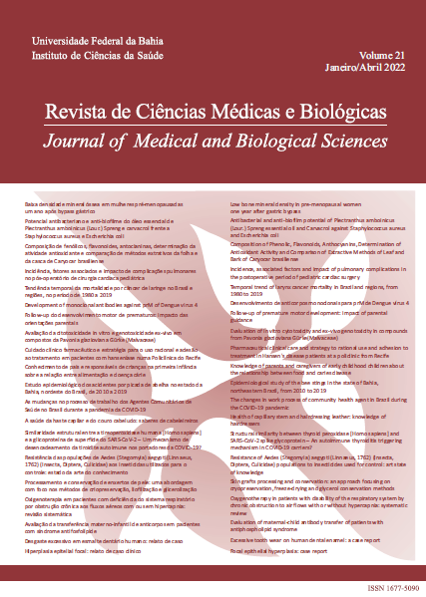Development of monoclonal antibodies against prM of Dengue virus 4
DOI:
https://doi.org/10.9771/cmbio.v21i1.44965Keywords:
Anticorpos monoclonais. DENV 4. prMAbstract
Introduction: dengue is a most common mosquito-borne viral disease in the Americas and tropical countries. Objective: in this work, mice were hyperimmunized with DENV 4 antigen to produce monoclonal antibodies (mAbs). Methodology: DENV 4 (GenBank KC806069) was inoculated in C6/36 cell monolayers cultivated in Leibovitz’s 15 medium supplemented with 5% fetal bovine serum and incubated at 28 C. The virus stock was submitted to concentration and ultracentrifugation and stored at -80 C until use (VC DENV 4). Balb/c mice were injected intraperitoneally with 50μg of DENV-4 and successive intraperitoneal injections of 25 μg of VC DENV 4 with Freund’s incomplete adjuvant were performed. The spleen cells were fused to SP2/0 myeloma cells with PEG 1540 and distributed in 96-well microplates with Iscove’s modified medium with Hipoxantina–Aminopterina–Timidina. Hybridoma screening by indirect ELISA showed positive results for six mAbs, and their characterization was performed by Western blotting and Indirect Immunofluorescence (IFI) techniques. Results: the six mAbs showed strong recognition of prM (24/29 kDa), and minor reaction to E protein (66 kDa), E/E protein dimer (105 kDa), and NS1 (49 kDa) protein in two mAbs. The use of mAbs anti-prM as a diagnostic tool using IFI has been demonstrated to detect DENV-4 antigen in infected cells or tissues. Conclusion: DENV 4 generate mAbs with strong reactivity to prM with potential use to confirm the presence of DENV 4 antigen in tissues or infected cells.
Downloads
Downloads
Published
How to Cite
Issue
Section
License
Copyright (c) 2022 Journal of Medical and Biological Sciences

This work is licensed under a Creative Commons Attribution 4.0 International License.
The Journal of Medical and Biological Sciences reserves all copyrights of published works, including translations, allowing, however, their subsequent reproduction as transcription, with proper citation of source, through the Creative Commons license. The periodical has free and free access.


